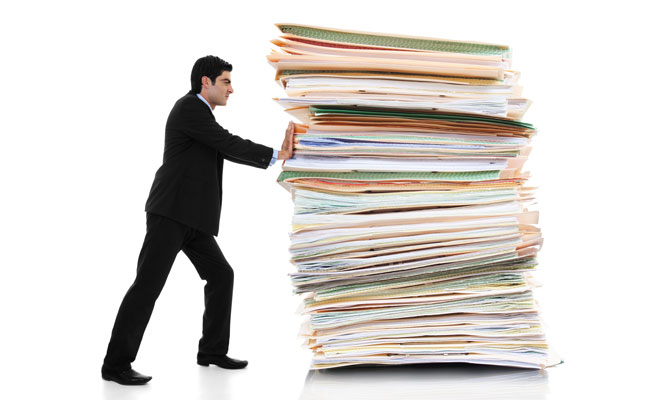For many law offices, the days of paper files may be coming to a close, as more and more offices are “going paperless”.
By Lidia Terrill, Family Lawyer
Do you ever feel like you are drowning in a sea of paper?

For many law offices, the days of paper files may be coming to a close, as more and more offices are “going paperless.” A paperless office is an office in which paper documents are converted to a digital format, thus greatly reducing an office’s reliance on paper. Benefits of having a paperless office include saving physical space, keeping files organized and easily searchable, and allowing attorneys to work anytime from anywhere without having to cart huge files around. The ultimate effect for many attorneys is a more efficient law practice.
Of course, there is a cost to going paperless, and any office must weigh the costs against the benefits. For many offices, the task of scanning and converting paper files to digital files can be enormous. Each document must be reviewed and categorized, and a decision needs to be made whether the document should be kept, destroyed, or returned to the client. There are costs associated with returning files to clients and shredding large amounts of paperwork.
Before going paperless, it is imperative that you refer to your state’s ethics opinions regarding file retention and digital file storage. If you chose to store client data on remote servers outside of the physical office, the general rule is that you must take “reasonable care” to protect client information. Reasonable care can include staying abreast of data safeguards, employing methods of password protection and encryption, or deleting data from the cloud at the conclusion of representation.
Going Paperless
Nevertheless, the cost-saving advantages of having a paperless office can be enormous. As files are scanned, office space can be condensed, with whole file-rooms being eliminated. Ongoing off-site storage fees would be reduced, including the labor associated with closing client files and transportation of files to and from the storage facility. Attorneys would not only become more efficient in areas such as legal research and discovery, but would also have the flexibility to work anywhere there is a power outlet and an internet connection.
It can be a daunting task to transition to a paperless office, and it is crucial to have a plan to implement the transition, with everyone in the office on board. Administrative staff, attorneys, file clerks, and mailroom clerks all need to be properly trained in the technology that is being used to create and store the digital files. Systems need to be developed as to how documents within the files are labeled and organized and how the files themselves should be named and organized. The good news is that the transition to a paperless office can occur piecemeal, with new practices being rolled out one at a time. For example, a firm could begin by making it a practice to begin scanning and digitally saving all mail that comes into the office, or scanning and saving all hand-written notes. Then, it can start converting active files to a digital format, followed by converting closed files to a digital format.
Although more and more law firms are going paperless, it is unlikely that we will soon be living in a world completely devoid of paper. Most attorneys still prefer handling hard copies to digital copies when reviewing detailed financial information or proof-reading documents. Perhaps one day the need for any paper documents will be obliterated all together, but until then, happy shredding!
Lydia Terrill, Esquire is an associate attorney at the firm of Vetrano|Vetrano & Feinman LLC, King of Prussia, Pennsylvania. She has chosen to limit her practice to family law, including the areas of divorce, custody, equitable distribution, child support, alimony, spousal support, enforcement/modification of property settlement agreements, and prenuptial agreements.
Published on:






